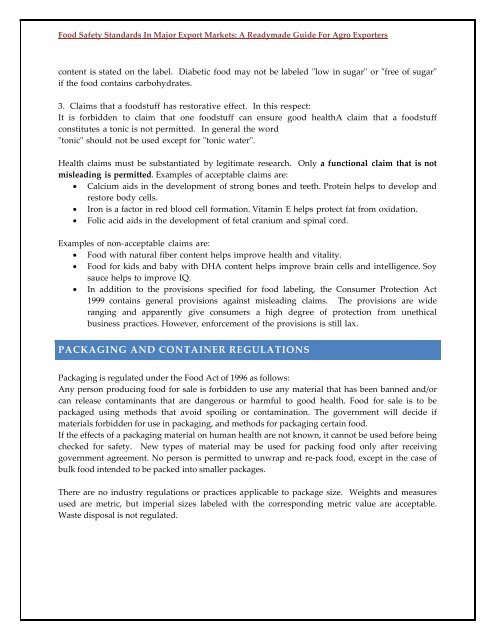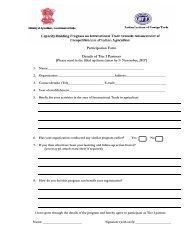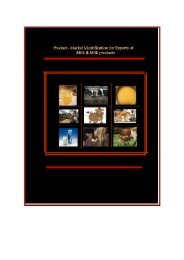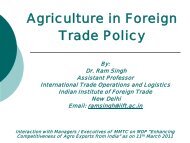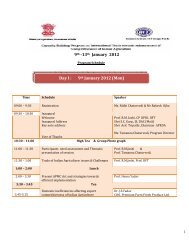All you should know before exporting to Indonesia - Ministry of ...
All you should know before exporting to Indonesia - Ministry of ...
All you should know before exporting to Indonesia - Ministry of ...
You also want an ePaper? Increase the reach of your titles
YUMPU automatically turns print PDFs into web optimized ePapers that Google loves.
Food Safety Standards In Major Export Markets: A Readymade Guide For Agro Exporters<br />
content is stated on the label. Diabetic food may not be labeled ʺlow in sugarʺ or ʺfree <strong>of</strong> sugarʺ<br />
if the food contains carbohydrates.<br />
3. Claims that a foodstuff has res<strong>to</strong>rative effect. In this respect:<br />
It is forbidden <strong>to</strong> claim that one foodstuff can ensure good healthA claim that a foodstuff<br />
constitutes a <strong>to</strong>nic is not permitted. In general the word<br />
ʺ<strong>to</strong>nicʺ <strong>should</strong> not be used except for ʺ<strong>to</strong>nic waterʺ.<br />
Health claims must be substantiated by legitimate research. Only a functional claim that is not<br />
misleading is permitted. Examples <strong>of</strong> acceptable claims are:<br />
Calcium aids in the development <strong>of</strong> strong bones and teeth. Protein helps <strong>to</strong> develop and<br />
res<strong>to</strong>re body cells.<br />
Iron is a fac<strong>to</strong>r in red blood cell formation. Vitamin E helps protect fat from oxidation.<br />
Folic acid aids in the development <strong>of</strong> fetal cranium and spinal cord.<br />
Examples <strong>of</strong> non‐acceptable claims are:<br />
Food with natural fiber content helps improve health and vitality.<br />
Food for kids and baby with DHA content helps improve brain cells and intelligence. Soy<br />
sauce helps <strong>to</strong> improve IQ.<br />
In addition <strong>to</strong> the provisions specified for food labeling, the Consumer Protection Act<br />
1999 contains general provisions against misleading claims. The provisions are wide<br />
ranging and apparently give consumers a high degree <strong>of</strong> protection from unethical<br />
business practices. However, enforcement <strong>of</strong> the provisions is still lax.<br />
PACKAGING AND CONTAINER REGULATIONS<br />
Packaging is regulated under the Food Act <strong>of</strong> 1996 as follows:<br />
Any person producing food for sale is forbidden <strong>to</strong> use any material that has been banned and/or<br />
can release contaminants that are dangerous or harmful <strong>to</strong> good health. Food for sale is <strong>to</strong> be<br />
packaged using methods that avoid spoiling or contamination. The government will decide if<br />
materials forbidden for use in packaging, and methods for packaging certain food.<br />
If the effects <strong>of</strong> a packaging material on human health are not <strong>know</strong>n, it cannot be used <strong>before</strong> being<br />
checked for safety. New types <strong>of</strong> material may be used for packing food only after receiving<br />
government agreement. No person is permitted <strong>to</strong> unwrap and re‐pack food, except in the case <strong>of</strong><br />
bulk food intended <strong>to</strong> be packed in<strong>to</strong> smaller packages.<br />
There are no industry regulations or practices applicable <strong>to</strong> package size. Weights and measures<br />
used are metric, but imperial sizes labeled with the corresponding metric value are acceptable.<br />
Waste disposal is not regulated.


